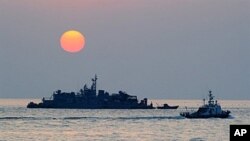SEOUL —
North Korea has threatened to attack South Korea over military drills on the anniversary of the North's 2010 shelling of a South Korean island. Seoul has dismissed the blustery rhetoric as routine, but political analysts warn of the possibility of repeat clashes.
On Friday, North Korea's military threatened to turn South Korea's presidential office into a “sea of fire” if Pyongyang feels like it is being provoked.
The Korean People's Army threat was in response to South Korean military exercises on Yeonpyeong island.
The drills mark the third anniversary of a North Korean attack on the island that killed four people, including two civilians.
Pyongyang's Korean Central Broadcasting Station read the warning of attack on the Blue House, known in Korean as Chongwadae.
Local media said that while three years ago the retaliatory blow was confined to Yeonpyeong island, this time Chongwadae and other bases of the “puppet forces” would be put within striking range.
North Korea routinely insults South Korea's government as a puppet of the United States.
Pyongyang justified the 2010 attack by claiming that the drilling South Korean forces fired into its territorial waters, which Seoul denies.
North Korea still claims territory near the island as the two sides never agreed on a maritime border when Korean War fighting ended.
The KPA statement glorified the 2010 island shelling, the first since the war, as a “praiseworthy event.”
South Korea's Defense Ministry spokesman, Wi Yong-sub, dismissed the bluster.
Wi said that North Korea must know that its rhetorical threat only unifies the South's military and citizens' determination to punish Pyongyang.
North Korea made similar threats in the past, including on the first and second year anniversaries of the attack, but did not carry them out.
Yang Moo-jin, a professor at the University of North Korean Studies, said that the lack of a formal maritime border and treaty ending the Korean War means there is always the possibility of more clashes.
Yang thinks that if tensions remain too strong between South Korea and North Korea, it will be difficult to avoid a second and third Yeonpyeong Island incident. Yang also said that f it happens again, the loser will be both South Korea and North Korea.
The Yeonpyeong shelling came just months after the sinking of a South Korean warship killed 46 sailors. An investigation concluded a North Korean torpedo was to blame, though Pyongyang denies that it was responsible.
South Korea has since built up its defenses on the island, and vowed an immediate retaliatory strike policy targeting up the chain of command.
On Friday, South Korea announced it would buy 40 F-35A stealth fighters jets from Lockheed Martin to upgrade its air force capabilities.
South Korea's Yonhap news agency reported that the military last month successfully fired a satellite-guided Spike missile. Yonhap reports that the Israeli-built missile is capable of precision strikes against North Korean coastal artillery.
VOA Seoul Bureau Producer Youmi Kim contributed to this report.
On Friday, North Korea's military threatened to turn South Korea's presidential office into a “sea of fire” if Pyongyang feels like it is being provoked.
The Korean People's Army threat was in response to South Korean military exercises on Yeonpyeong island.
The drills mark the third anniversary of a North Korean attack on the island that killed four people, including two civilians.
Pyongyang's Korean Central Broadcasting Station read the warning of attack on the Blue House, known in Korean as Chongwadae.
Local media said that while three years ago the retaliatory blow was confined to Yeonpyeong island, this time Chongwadae and other bases of the “puppet forces” would be put within striking range.
North Korea routinely insults South Korea's government as a puppet of the United States.
Pyongyang justified the 2010 attack by claiming that the drilling South Korean forces fired into its territorial waters, which Seoul denies.
North Korea still claims territory near the island as the two sides never agreed on a maritime border when Korean War fighting ended.
The KPA statement glorified the 2010 island shelling, the first since the war, as a “praiseworthy event.”
South Korea's Defense Ministry spokesman, Wi Yong-sub, dismissed the bluster.
Wi said that North Korea must know that its rhetorical threat only unifies the South's military and citizens' determination to punish Pyongyang.
North Korea made similar threats in the past, including on the first and second year anniversaries of the attack, but did not carry them out.
Yang Moo-jin, a professor at the University of North Korean Studies, said that the lack of a formal maritime border and treaty ending the Korean War means there is always the possibility of more clashes.
Yang thinks that if tensions remain too strong between South Korea and North Korea, it will be difficult to avoid a second and third Yeonpyeong Island incident. Yang also said that f it happens again, the loser will be both South Korea and North Korea.
The Yeonpyeong shelling came just months after the sinking of a South Korean warship killed 46 sailors. An investigation concluded a North Korean torpedo was to blame, though Pyongyang denies that it was responsible.
South Korea has since built up its defenses on the island, and vowed an immediate retaliatory strike policy targeting up the chain of command.
On Friday, South Korea announced it would buy 40 F-35A stealth fighters jets from Lockheed Martin to upgrade its air force capabilities.
South Korea's Yonhap news agency reported that the military last month successfully fired a satellite-guided Spike missile. Yonhap reports that the Israeli-built missile is capable of precision strikes against North Korean coastal artillery.
VOA Seoul Bureau Producer Youmi Kim contributed to this report.




